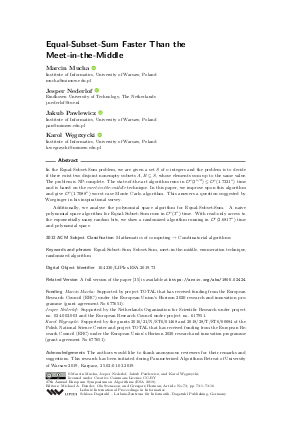@InProceedings{mucha_et_al:LIPIcs.ESA.2019.73,
author = {Mucha, Marcin and Nederlof, Jesper and Pawlewicz, Jakub and W\k{e}grzycki, Karol},
title = {{Equal-Subset-Sum Faster Than the Meet-in-the-Middle}},
booktitle = {27th Annual European Symposium on Algorithms (ESA 2019)},
pages = {73:1--73:16},
series = {Leibniz International Proceedings in Informatics (LIPIcs)},
ISBN = {978-3-95977-124-5},
ISSN = {1868-8969},
year = {2019},
volume = {144},
editor = {Bender, Michael A. and Svensson, Ola and Herman, Grzegorz},
publisher = {Schloss Dagstuhl -- Leibniz-Zentrum f{\"u}r Informatik},
address = {Dagstuhl, Germany},
URL = {https://drops.dagstuhl.de/entities/document/10.4230/LIPIcs.ESA.2019.73},
URN = {urn:nbn:de:0030-drops-111946},
doi = {10.4230/LIPIcs.ESA.2019.73},
annote = {Keywords: Equal-Subset-Sum, Subset-Sum, meet-in-the-middle, enumeration technique, randomized algorithm}
}

 Creative Commons Attribution 3.0 Unported license
Creative Commons Attribution 3.0 Unported license











































